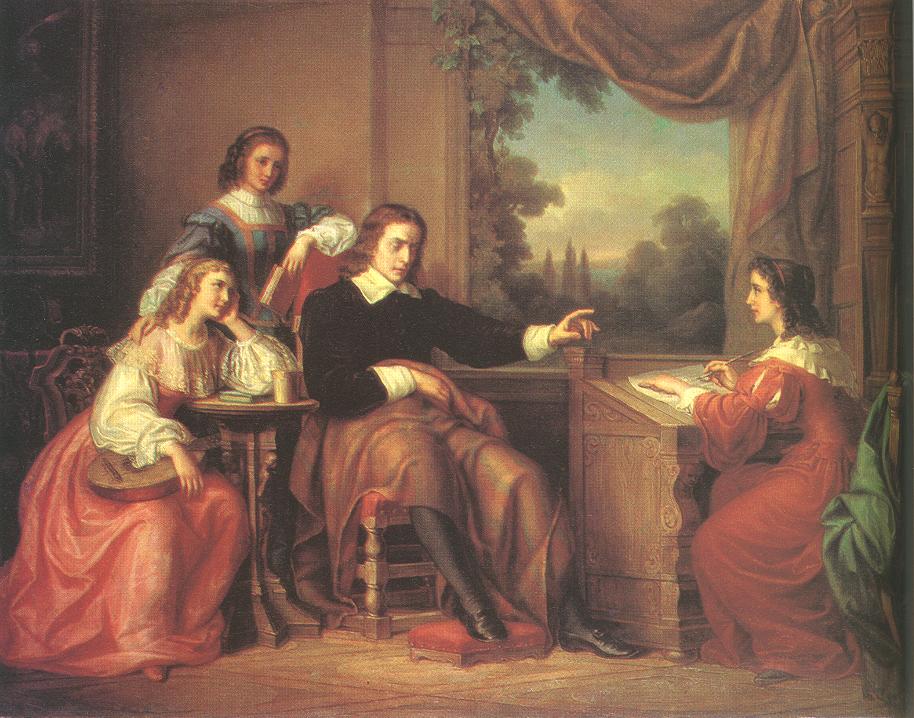Fourth Friend: John Milton, "Sonnet XIX: When I Consider How my Light is Spent"
If you’ve been on social media for any significant length of time, you’ve probably seen a meme purporting to show books typical for each of the three major branches of Christianity. For Catholicism, it has Dante Alighieri’s The Divine Comedy, for Eastern Orthodoxy, Fyodor Dostoyevsky’s The Brothers Karamazov, and for Protestantism, Joel Osteen’s Become a Better You. It’s funny, yes, but it also annoys me a little. For one thing, though I hate heresy and consider their revolt against the Church the greatest catastrophe of the past several centuries, I do have some sympathy for Protestants. I live in the American South, after all, which despite a significant Catholic presence is still a fundamentally Protestant place. Many of my friends belong to one of those denominations, and when I think of Protestants I first think, not of the despicable Luther and Calvin or the dopey Osteen, but of my Baptist grandfather, who in the last decade or so of his life approached his church with full sincerity, and collected an impressive library of different editions and translations of Scripture, comparing each and considering the commentaries of various theologians.
Also, it offends my sense of fairness, because there have been many great works of Protestant literature. I don’t think any come to the level of The Divine Comedy, but Protestants can claim no lesser artists than Shakespeare, Marlowe, Spenser, Donne, and indeed most great English authors from the Elizabethan era onward. Bl. John Henry Newman went so far as to say that the English literary tradition is fundamentally Protestant. Now, that was already debatable when he said it in the 1852, and it has become even more so since then, but I ultimately do agree with him and it’s hard to argue that there isn’t some truth to it.
 What, then, should we put forward as the definitive Protestant work of literature? There are a few possibilities, but the strongest contender must be John Milton’s epic, Paradise Lost. If I had world enough and time, I’d take a shot at memorising at least a part of that, but for now, I must content myself with something shorter. Though he’s best known for his epic, and for good reason, he was a prolific poet and wrote a number of other excellent, shorter works, as well. For this Hundred Friends series, I specifically chose his sonnet, “When I Consider How My Light is Spent.” For context, this is the first reference Milton makes in poetry to his blindness, which became complete in 1652, so it would’ve been written shortly after this. Representative Poetry Online puts the likely date at 1655.
What, then, should we put forward as the definitive Protestant work of literature? There are a few possibilities, but the strongest contender must be John Milton’s epic, Paradise Lost. If I had world enough and time, I’d take a shot at memorising at least a part of that, but for now, I must content myself with something shorter. Though he’s best known for his epic, and for good reason, he was a prolific poet and wrote a number of other excellent, shorter works, as well. For this Hundred Friends series, I specifically chose his sonnet, “When I Consider How My Light is Spent.” For context, this is the first reference Milton makes in poetry to his blindness, which became complete in 1652, so it would’ve been written shortly after this. Representative Poetry Online puts the likely date at 1655.
When I consider how my light is spent
Ere half my days in this dark world and wide,
And that one talent which is death to hide
Lodg’d with me useless, though my soul more bent
To serve therewith my Maker, and present
My true account, lest he returning chide,
“Doth God exact day-labour, light denied?”
. I fondly ask. But Patience, to prevent
That murmur, soon replies: “God doth not need
Either man’s work or his own gifts: who best
Bear his mild yoke, they serve him best. His state
Is kingly; thousands at his bidding speed
And post o’er land and ocean without rest:
They also serve who only stand and wait.”
In Catholic terms, we might call “stand[ing] and wait[ing]” the contemplative life, though that’s not quite what Milton describes. In any case, we should perform works of charity while we can, because at some point in our lives we may no longer be able to do so, whether due to the frailty of old age, sickness, injury, or something else. At that point, we become more objects of charity than workers, but as Milton points out here, as useless as one may feel, that does not mean that we are no longer of value in God’s Kingdom. Milton, for his part, did continue to write by dictating to his daughters, but everyone is capable of prayer and meditation.
However, prayer and meditation, outside the rare miracle, doesn’t produce the obvious effects that, say, the corporal works of mercy do, so it feels as though our talents are “Lodg’d with [us] useless.” To the pious, this is understandably frustrating, but the Kingdom of Heaven will get along just fine. “God doth not need / Either man’s work or his own gifts,” but He can accomplish His will using any means He pleases. What He expects of us are not great works, but rather, “who best / Bear his mild yoke, they serve him best.” If that means putting great talents to use, wonderful. If, however, that simply means carrying our cross, whatever that may be in our life, that is sufficient.